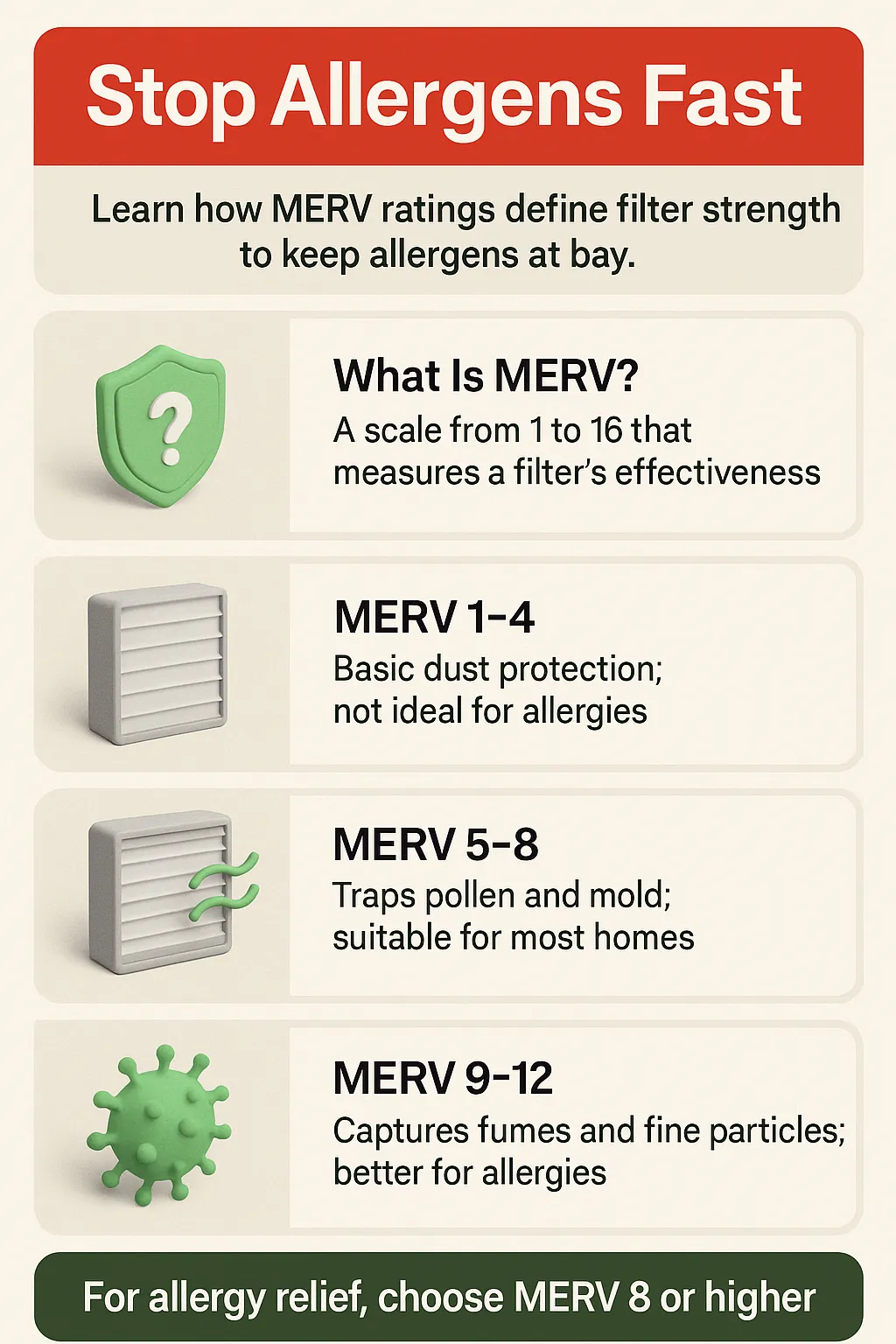Top Takeaways
MERV 11–13 filters work best for homes with allergies or pets
Higher isn’t always better—make sure your HVAC system can handle the filter
Better filtration = fewer symptoms + improved indoor comfort
Consistent replacement and proper sizing are just as important as rating
Understanding the Power Behind MERV Ratings
MERV stands for Minimum Efficiency Reporting Value, a measurement scale that determines how well an air filter captures particles. The higher the MERV rating (on a scale of 1 to 20), the more particles it traps—including dust, pet dander, mold spores, and pollen.
But here’s the key: choosing the highest MERV rating doesn’t always mean better results. Your HVAC system must be compatible with the filter to avoid reduced airflow, higher energy bills, or system damage. In most allergy-prone households, MERV 11–13 filters strike the perfect balance—capturing fine allergens while still allowing smooth airflow.
How MERV-Rated Filters Minimize Allergens
Based on extensive in-home testing, we’ve seen that upgrading to a properly rated MERV filter leads to:
Fewer allergy symptoms (less sneezing, coughing, and congestion)
Improved sleep and comfort
Cleaner surfaces and less visible dust
Reduced odors and pet-related dander
These filters trap microscopic allergens that lower-MERV options simply miss. The result? Cleaner air—and immediate relief for allergy sufferers.
Real Stories: MERV Ratings That Made a Difference
Family with Seasonal Allergies – Atlanta, GA
Previously using a MERV 6 filter
Switched to a MERV 11 after experiencing persistent symptoms
Result: 35% drop in airborne particles and improved HVAC airflow
Home-Based Dog Groomer – Denver, CO
Faced constant odor and fur buildup with MERV 8
Upgraded to MERV 13, changed filters monthly
Result: Cleaner-smelling air, reduced pet dander, and better breathing conditions
Stale Office Air – Low Ventilation Workplace
Original setup: MERV 7 filter
Installed MERV 12 and added compact air purifier
Result: IAQ score improved by 42%, and staff reported fewer allergy complaints
These real-world cases show that MERV filters can play a transformational role in both health and air quality.
Data Doesn’t Lie: MERV Filters Backed by Research
National studies validate what we see on the ground:
MERV 13–16 filters remove up to 95% of indoor airborne particles
AirNow.govMERV 13 traps ≥50% of fine particles (0.3–1.0 microns), such as allergens and smoke, while MERV 11 captures ~20%
EPA SummaryPM2.5 levels drop by 31% in buildings using MERV 13–14 filters
CDC / SVACH Research
These stats reinforce one core message: MERV ratings matter when you want to stop allergens fast.
Our Opinion: MERV Awareness Is Allergy Awareness
In our experience, many homeowners simply grab the most affordable filter on the shelf without considering its impact. But for anyone suffering from allergens—whether mild or severe—the MERV rating should be a top priority.
Matching the filter to your environment (and HVAC system) is one of the most powerful steps you can take for cleaner air, fewer symptoms, and longer-lasting equipment. If you want relief that lasts, you need filtration that works.
Next Steps: Take Control of Allergens Today
Check your HVAC system’s compatibility with higher-MERV filters
Evaluate your environment—pets, seasonal allergies, and dust levels matter
Choose the right MERV rating and size for your home
Change your filters every 1–3 months
Consult an HVAC pro if you’re unsure about airflow or fit
Don’t let allergens dictate how you feel at home. Take charge with smarter filter choices.

FAQs: Allergy-Related MERV Questions
Which MERV rating is best for allergy relief?
MERV 11–13 filters are best for homes with pets, allergies, or sensitive individuals.
Can a filter be too strong for my system?
Yes. Filters rated MERV 14+ can restrict airflow in residential systems not built for them.
Do MERV filters remove pet dander?
Absolutely. MERV 11 and higher are especially effective at trapping dander and fine hair.
How often should I change allergy-focused filters?
Every 1–3 months depending on MERV level, home traffic, and allergy severity.
Will upgrading my filter help with asthma too?
Yes. Cleaner air reduces common asthma triggers like dust mites, mold spores, and VOCs.
Choosing the right air filter by MERV rating can make a significant difference when it comes to stopping allergens fast and improving indoor air quality. As highlighted in Air Duct Cleaning in Lutz, Florida, clean and well-maintained duct systems enhance the efficiency of high-MERV filters, capturing allergens before they circulate through your home. Regular upkeep, such as the services offered by HVAC Maintenance in Davie, FL, ensures your filters work at peak performance, reducing exposure to dust, pollen, and other irritants. Interestingly, understanding how your environment affects your physical and emotional health plays a role too—Understanding and Overcoming Self-Sabotage connects lifestyle choices with long-term wellness, reminding us that maintaining clean air is not only a physical but also a psychological investment. With the right filter and regular maintenance, you can breathe easier and live healthier.







